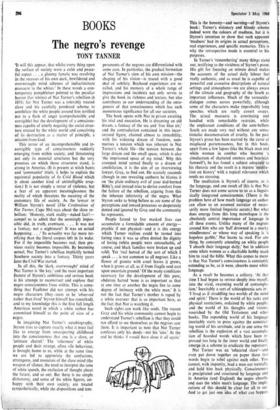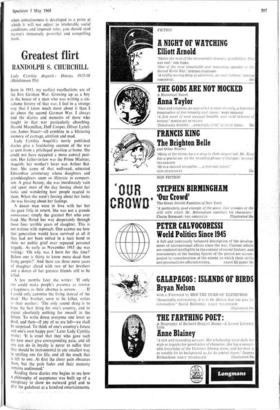The negro's revenge BOOKS
TONY TANNER
It will this appear, that whilst every thing upon the surface of society wore a calm and peace- ful aspect . . . a gloomy fanatic was revolving in the recesses of his own dark, bewildered and overwrought mind schemes of indiscriminate massacre to the whites.' In these words a con- temporary pamphleteer pointed to the peculiar horror (for whites) of Nat Turner's rebellion in 1831; for Nat Turner was a tolerably treated slave and his carefully pondered scheme to annihilate the white people around him testified not to a flash of anger (comprehensible and corrigible) but the development of a conscious- ness capable of utterly negating the social struc- ture erected by the white world and conceiving of its destruction as a matter of principle, a mission from God.
This terror of an incomprehensible and in- corrigible type of consciousness suddenly emerging from within society, and threatening not only its material structures but the very premises on which those structures stand, is strong in America. (It is present at witch hunts and 'communist' trials; it helps to explain the equivbeal popularity of In Cold Blood which is about another kind of unintelligible erup- tion.) It is not simply a terror of violence, but a fear of an apparent meaninglessness The reality of which threatens the meaning of the customary life of society. As the lawyer in William Styron's novel (The Confessions of Nat Turner, Cape 30s) says about the slave re- bellion: 'Honesty, stark reality—naked fact!— compel us to admit that the seemingly impos- sible did, in truth, eventuate. . . It was not a fantasy, not a nightmare! It' was an actual happening. . . .' Its actuality-was far more ter- rifying than the literal corpses left in its wake. For if the impossible becomes real, then pre- vious reality becomes impossible. By becoming actual, Nat Turner's rebellion implicitly turned Southern society into a fantasy. Thirty years later the Civil War started.
In all this, the 'dark, overwrought' mind of Nat Turner is 'the key,' and the most important feature of Styron's ambitious and serious book is his attempt to reconstruct and explore that negro consciousness from within. This is some- thing that Faulkner did not attempt with his negro characters (they .seem to be 'observed rather than lived' Styron himself has remarked), and to my knowledge this is the first full length American novel in which a white author has committed himself to the point of view of a negro.
In imagining Nat Turner's autobiography, Styron tries to capture exactly what it must feel like to emerge from unsuspecting childhood into the consciousness that one is a slave, or 'animate chattel.' The 'otherness' of white people and their strange, often vile behaviour, is brought home to us, while at the same time we are led to appreciate the confusions, stratagems, and resources of the slave mind (the weapon of silence, the need to interpret the tone of white speech, the exclusion of thought about the future, and so on). But there is no simple dichotomy, and some of the white figures, un- happy with their own society, are treated sympathetically, while the dispositions and tem- peraments of the negroes are differentiated with some care. In particular, the gradual formation of Nat Turner's view of his own mission—the shaping of his vision—is traced with a good deal of subtlety. Boyhood experiences are re- called, and his memory of a whole range of impressions and incidents not only serves to give the book its richness and texture, but also contributes to our understanding of the onto- genesis of that consciousness which has such momentous significance for all our societies.
The book opens with Nat in prison awaiting his trial and execution. He is dreaming an old dream, a fantasy of the sea and 'free blue air,' and the contradiction contained in this incar- cerated figure, chained almost to immobility, with his widening dream of freedom, sum- marises a tension which was inherent in Nat Turner's whole life—the -tension between the large dream and the small space, which is also 'the imprisoned space of my mind.' Why this cramped mind turned finally to a dream of annihilation, it is the aim of an interviewing lawyer, Gray, to find out. He scarcely succeeds (though in one revealing outburst he blames it on 'the plain ordinary evil of your dad-burned Bible), and instead tries to derive comfort from the failure of the rebellion, arguing from this the inherent inferiority of the -negro. What Styron seeks to bringbefore us are sonic of the perceptions and inward processes so desperately denied and ignored by Gray and the community he represents.
People forced to live masked lives can accumulate a formidable amount of energy— psychic if not physical—and it is this energy which Turner realises could be turned into hating since It was so often denied the dignity of loving (white people were untouchable, of course, and black families were broken up and sold). Yet 'real hatred of the sort of which I speak ... is not common to all negroes. Like a flower of granite with cruel leaves it grows, when it grows at all, as if from fragile seed cast upon uncertain ground.' Of the many conditions necessary for the development of this pure, obdurate hatred 'none is as important as that at one time or another the negro live to some degree of intimacy with the white man.' It is not the fact that Turner's mother is raped by a white overseer that is so important here, as the fact that Nat is watching it.
Such sights can work like seeds. The reason Gray and his white community cannot begin to understand Turner's rebellion is that they could not afford to see themselves as the negroes saw them. It is important to note that Nat Turner confesses only his deeds—not his 'sins.' At the end he thinks 'I would have done it all again.' This is the honesty—and warning—of Styron's book: Turner's visionary and bloody scheme indeed wore the colours of madness, but it is Styron's intention to show that such apparent 'madness' had its origins in actual perceptions, real experiences, and specific memories. This is why the retrospective mode is essential to his purposes.
In Turner's 'remembering' many things stand out, testifying to the vividness of Styron's prose. His gift for focusing on minute detail makes the accounts of the actual daily labour feel really authentic, and as usual he is capable of powerful and evocative descriptions of natural settings and atmosphere—we are always aware of the climate and geography of the South as important influences. Much of the vernacular dialogue _comes across powerfully, although some of the characters make improbably long speeches which are really covert essays. The actual massacre is convincing and handled with remarkable restraint, while the unpleasant conditions of the ante-bellum South are made very real without any sensa- tionalist documentation of cruelty. In the past Styron's prose has been marred by the curse of misplaced portentousness, but in this- book, apart from a few lapses (like the black man and white woman in combat who become 'a simulacrum of shattered oneness and heartsick farewell), he has found a subject adequate to his rhetoric and the result is a mature 'medita- tion on history' with a topical relevance which needs no stressing.
The meditation is Styron's of course, as is the language, and one result of this is that Nat Turner does not come across to us as a linguis- tically integrated consciousness. (There is the problem here of how much language an author can allow to an assumed narrator of neces- sarily more limited linguistic means.) But what does emerge from this long monologue is the absolutely central importance of language in all these events. Unlike many of the negroes around him who are 'half drowned in a murky mindlessness' or whose way of speaking is 'a hopeless garble,' Nat learns to read. For one thing, by constantly attending on white people 'I absorb their language daily,' but in addition some white women as a charitable hobby teach him to read the bible. What this comes to mean is that Nat Turner's consciousness is constantly extending as he, as it were, absorbs more white language.
As a result he becomes a solitary. 'At that time I had begun to retreat deeply into myself, into the vivid, swarming world of contempla- tion.' Inevitably a sort of schizophrenia sets in : 'I lived as if straddling two worlds of the mind and spirit.' There is the wOrld of his tasks and physical restrictions, ordained by white peojile: and the world of his thoughts and visions, nourished by the Old Testament and other books. The expanding world of his language inevitably starts to press against the constrict- ing world of his servitude, and in one sense the rebellion is the explosion of a vast accumula- tion of hoarded words which- have been re- pressed too long in the inner world and finally emerge in a scheme to eradicate the repressers.
Nat Turner was an 'educated slave'—and even put down together on paper those two words begin to rebel against each other. You cannot, with impunity, lead a man out mentally and hold him back physically. Consciousness is precipitated and structured by language and in America (and England) the negro absorbs and uses the white man's language. The impli- cations of this should be clear for all to see- And to get just one idea of what can happen when consciousness is developed to a point at which it will not adjust to intoleTable social conditions and imposed roles, you should read Styron's immensely powerful and compelling book.







































 Previous page
Previous page